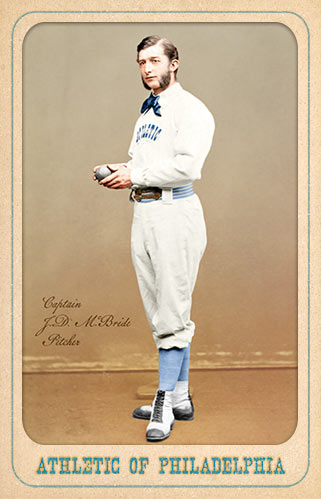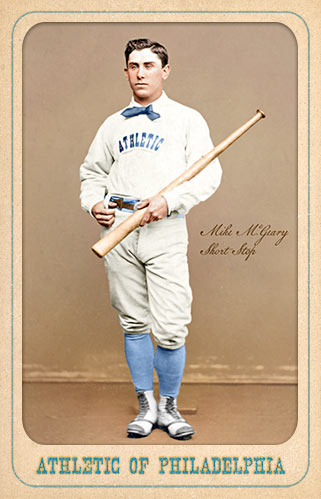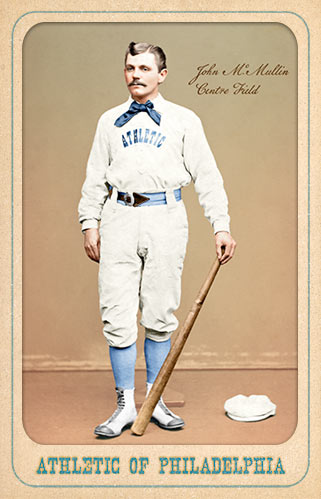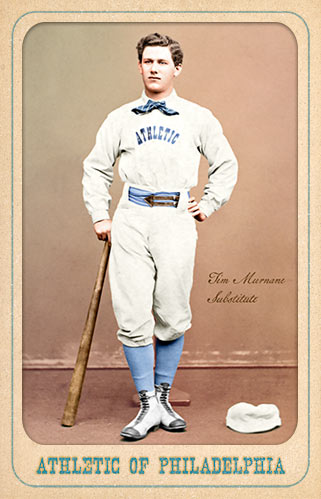
- Series: Athletic of Philadelphia: 1874
- City: Philadelphia
- Team: Athletics (NAPBBP)
- League: National Association (NAPBBP)
John Dickson McBride (1847-1916) was the captain and workhorse moundsman of the Philadelphia Athletics during the team’s five years in the National Association of Professional Base Ball Players (NAPBBP), from 1871-75. Despite piloting the Athletics to a 161-84 (.657) record over 5 years in which he won 149 of those games as a pitcher, McBride suffered the indignity of being ousted as captain (manager) with a mere eight days remaining in the '75 season. Some of the humiliation should have been assuaged by the fact that ownership decided to replace him with a young Adrian Anson - a man who would become perhaps the most formidable and accomplished player of the 19th century.
It would be difficult to overstate McBride's impact with the Athletics. In 1871, Dick led the NA in winning percentage, going 18-5, and leading the team to the circuit’s first pennant, thus winning professional baseball's first league championship. In ‘74 Dick led the NA in ERA at 1.64. Second in career National Association wins only to Albert Spalding, McBride was 149-74 for Philadelphia overall and was putting the finishing touches on an astounding 44-14 season when he was replaced by Anson. (The team's record was 49-18-2 (.731) under McBride. Anson would pilot the team to a 4-2-2 record over the last eight games of the season and the NA would fold shortly thereafter, giving way to the nascent National League in 1876.)
McBride was a Civil War vet and former cricket star who developed into one of the era's best pitchers. No less than Henry Chadwick said of him: “what Dick doesn’t know about the tricks and dodges of strategic pitching isn’t worth knowing.” Years later, former teammate and famous scribe Tim Murnane asserted that Dick was “the first to master the ‘raise ball.’”
- Was apparently renowned as a baseball player as early as 1864, when he was allowed to take a 3-day furlough from his Civil War service to participate in a baseball exhibition
- Completed 224 of the 233 games he started for the Athletics and never once made a relief appearance
- Signed in ‘76 with Boston in the new NL, but didn’t win a game in four outings and retired
- McBride's "most similar" player according to baseballreference is Candy Cummings

- Series: Athletic of Philadelphia: 1874
- City: Philadelphia
- Team: Athletics (NAPBBP)
- League: National Association (NAPBBP)
Michael Henry McGeary (1851-1933) was, per Sporting Life in 1905, “the best runner in his profession,” due largely because he was “the one player who regularly practiced sliding.” McGeary was also nearly impossible to strikeout. From 1871-76, McGeary fanned only six times in 1,518 plate appearances.
Mike began in pro ball with the Troy Haymakers in ‘70 and stayed with the team as it became a founding member of the National Association the next season. Usually an infielder, Mike was the shortstop for the Philadelphia Athletics when Al Spalding led his Boston club and the A’s on a tour of Britain and Ireland in the summer of 1874. Designed by Harry Wright to promote the game in Europe, the expensive effort failed to generate interest.
McGeary joined the new NL with the St. Louis Browns in 1876 during the era when gambling was rife and William Hulbert was bent on reform. Long-suspected of throwing games, McGeary was the first NL player accused. Suspended and reinstated due to a lack of evidence, Mike continued to generate rumors and suspicion but escaped sanctions and completed over a decade in the game.
- Sporting Life in 1888 described the yellow “parasol” captain McGeary used to signal to the bettors in the grandstands. In one 1875 game, Mike made five of his Philadelphia White Stockings’ 21 errors in a loss to Chicago, reportedly earning each Philadelphia player between $300-$500 from the gamblers.
- From 1871-1875, McGeary averaged 1.22 runs per game, scoring 305 runs in 250 games
- Over his career, McGeary struck out just 60 times in 2,507 plate appearances
- One of the most prominent players of the era, Mike appears on an 1871 Burr Pennfield Troy Haymaker Scorecard. Inspired by and rarer than the Mort Rogers' Scorecards, such "photographic picture cards" were important precursors to the modern baseball card


- Series: Athletic of Philadelphia: 1874
- City: Philadelphia
- Team: Athletics (NAPBBP)
- League: National Association (NAPBBP)
John F. McMullin (1849-1881) began amateur ball with his hometown Keystones of Philadelphia in 1867 as an outfielder. He moved to the Buckeye of Cincinnati in ‘68 and the Haymakers of Troy in ‘70, with whom he joined the first openly professional league in 1871. He pitched for Troy his first season when the only other southpaw hurler in the NABBP was Charlie Pabor of the Union of Morrisania (who is more renowned for his nickname, The Old Woman in the Red Cap, than for his mound prowess). McMullin also pitched some for the National Association's Troy entry in ‘71, and is the only known lefty to pitch regularly that year. He served as an emergency pitcher in two games across the 1872 and ‘73 campaigns, but played primarily in the outfield the rest of his career. He always had respectable years at the plate, including his final season with the Philadelphia White Stockings in 1875 where he hit .257. His best year had been with the Athletics in 1874, leading the team with 90 hits and a .346 average.
After being a pioneering member of baseball's first two organized leagues and playing nearly all of his teams' games in the five year history of the National Association, McMullin never played a single game in the National League that replaced it. It is not known why McMullin’s tenure in baseball ended so abruptly on the eve of the modern major leagues and he would die a few short years later at age 32 in his native Philadelphia.
- In 1877, McMullin appeared as one of three managers of a Philadelphia entry in the League Alliance, a loose consortium of teams in the Northeast that formed as a response to the new NL
- Like teammate Mike McGeary, McMullen [sic] appears on an 1871 Burr Pennfield Troy Haymaker Scorecard. Inspired by and rarer than the Mort Rogers' Scorecards, such "photographic picture cards" were important precursors to the modern baseball card


- Series: Athletic of Philadelphia: 1874
- City: Philadelphia
- Team: Athletics (NAPBBP)
- League: National Association (NAPBBP)
- Hall: J.G. Taylor Spink Award Recipient
Timothy Hayes Murnane (1851-1917) vaulted from a career in the early days of the game to become the noted baseball writer for the Boston Globe for three decades. As a player, Murnane had occasional success, but remained less than full time. He did place fifth in the National Association in 1872 with a .359 average for the Middletown (CT) Mansfields. He was in Philadelphia with the Athletics and White Stockings for the final years of pre-modern baseball in the NA before joining the Boston Red Caps (Beaneaters) in the inaugural season of the National League, 1876, and won a pennant the following year. Murnane’s incisive grasp of the game would manifest in a varied career as field manager, executive, owner and minor league president over the ensuing decades. But it was with the pen rather than the bat that Murnane made his greatest mark. In 1946, the Hall of Fame established the Honor Rolls of Baseball to recognize non-player contributions and Murnane was among a dozen scribes enrolled. Murnane was the 1978 recipient of the J.G. Taylor Spink Award commemorating outstanding achievement by the Baseball Writers’ Association of America.
- In his eight-year career as player, Murnane averaged .261. His final season was as player/manager for the Union Association’s Boston Reds as they tried vainly to challenge the NL
- Recipient of the J.G. Taylor Spink Award: 1978





